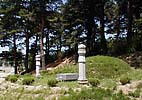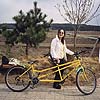|
25 April:
I've finally had a fiber contact! There was an article
in the Korea Herald about the restaurant Damwon and its Magnolia Festival. The owner
of Damwon is a fiber artist and was offering a public dyeing session. So of course I had
to go. I tried to find someone to go with me, for interpretation as much as anything else,
but everyone said it would be much too difficult. "If you live in Seoul, maybe," they all
said, "but from Kangnung it would be impossible." So I set off to do it by myself.
It made me think about the
fortune teller
I saw at Kyongpo Beach. He said I had the spirit of a man in the body of a woman, and
I expect that's true by Korean standards -- although I'm sure it comes from being
American more than anything else.
Anyhow, I caught the bus from Kangnung to Seoul at 7 am. It took about 4 hours to get
there, on roads (these were expressways, mind you) that would give West Virginia back
roads a run for their money in terms of twists and curves.
The buses are pretty comfortable, with a fair bit of legroom. There were even a few
stretches that were straight enough that I could knit a little.
When I got to Seoul, the next step was to find the subway. The subway station was
conveniently located right across the street from the express bus station, and even
better, it turned out to be the very station I was supposed to take the subway to.
So I was able to bypass the subway altogether.
Next step was to catch bus 133-1 to Toichon. So I walked around the building until I saw
a bus stop, which had several busses lined up. None of them was the right number, so
I asked one of the drivers where to catch #133-1. He was directing me around the corner
when a passerby (they always seem to come along when I need them) asked where I
was going. I showed him the article (it got a lot of use over the weekend) and he talked
to the bus driver, and then said that bus went to Toichon. So I climbed on and off we went.
It was about 30 or 45 minutes to Toichon, and the driver said I would have to change
busses there. When I got off and he had turned the bus around, he also got off and led
me to a rice cake shop and talked to the people there. They invited me in to sit down.
I was glad, because it was getting cold and rainy, and I had forgotten my umbrella
(it wasn't raining when I left Kangnung). I figured they would send me out when the
right bus came along. Well, they did send me out, but it was when a taxi came along.
There was another lady also going to Damwon, and we shared the cab. She shared
her umbrella with me from the cab into the restaurant, too.
I made better time than I'd expected. I had worried about getting there by 2, and we
made it there around noon. So we had lunch together, and talked what little we could
talk. She showed me a letter she had gotten from Damwon talking about the Magnolia
Festival, and I showed her my article, and we compared the Korean and the English.
She gave me her card (this is very common in Korea, but I have no cards to give in
return). Her name is Kim Bo-Kan -- that much on the card is in English. She lives in
Seoul -- that much is in Korean. The rest is in Chinese. Not only could I not read it,
but nobody at the institute was able to read it all to me.
All they could get was that she's a singer. She was very elegant and very nice. She's
74, and graduated high school in 1947, just 2 years after the end of the Japanese
occupation of Korea. So all through school she was forced to study Japanese as
a second language. She has 3 grandchildren.
She talked a lot more than that, and unfortunately I understood very little of it. It
made me wonder if the people I talk to understand as little of what I say.
 The dining room appeared to be an enclosed front porch. It had great crooked trees for
ceiling beams, lots of wood, works of art, classical music, and a
glass case
with skeins of yarn dyed by the owner. We admired the magnolia blossoms out the
windows on one side of the room, and the raindrops coming off the thatch roof and falling
into the lily pond outside the window by our table.
The dining room appeared to be an enclosed front porch. It had great crooked trees for
ceiling beams, lots of wood, works of art, classical music, and a
glass case
with skeins of yarn dyed by the owner. We admired the magnolia blossoms out the
windows on one side of the room, and the raindrops coming off the thatch roof and falling
into the lily pond outside the window by our table.
Lunch was very nice, but expensive. Damwon is a place where you pay for
atmosphere and presentation and quality of food, but not for quantity -- just the opposite
of the other Korean restaurants I've visited. Lunch was Egyptian -- the chef had come
to prepare it the day before, and he was coming back that night to do dinner. He was
the head chef of the Egyptian Embassy, and was coming there especially for the
Magnolia Festival.
After lunch, we had magnolia tea. It was kind of funny -- two huge magnolia flowers
carefully laid side by side in this tiny teapot. After they'd brewed a couple of minutes,
our server (a writer) poured the tea into a small bowl with a bit of a pitcher-lip on one
side and added more hot water to the flowers, and then poured from the bowl into our
cups. The tea was interesting; more of an aftertaste than a taste, hard to describe.
Not enough flavor to drink much or often, but fine for once a year at a festival. I had
no idea you could drink magnolias.
After 2:00 we climbed up the hill to the owner's house for the dyeing. Read about the
workshop
here, or just view the photos
here.
The weather cleared up after the dyeing session -- good thing, because they were moving
all of the furniture out of the dining room. When I'd arrived at Damwon, I'd noticed a
couple of people out in the rain, welding metal pipe. That seemed odd at the time. It
turned out that they were making spits. These were put to work, roasting lambs over
open fires.
 To tell the truth, though, a whole skinned
sheep
with a rod through it, charred black on the outside and with its muscles slashed, is not
a very appetizing sight. The head was still attached, and wasn't cooking too well, so it
seemed to be staring balefully at us. Fortunately, it had no eyes. One girl I talked to
said that the lamb had arrived with its eyes intact, but they removed them. This
surprised me a bit; Koreans seem to eat fish heads and eyes with great glee. She
also said that they'd wanted to remove the head, but the chef wanted it served.
To tell the truth, though, a whole skinned
sheep
with a rod through it, charred black on the outside and with its muscles slashed, is not
a very appetizing sight. The head was still attached, and wasn't cooking too well, so it
seemed to be staring balefully at us. Fortunately, it had no eyes. One girl I talked to
said that the lamb had arrived with its eyes intact, but they removed them. This
surprised me a bit; Koreans seem to eat fish heads and eyes with great glee. She
also said that they'd wanted to remove the head, but the chef wanted it served.
I couldn't stay for the lamb dinner because I was concerned about missing the last bus
home, and for lack of money to pay for the bus. But while I was talking to people
around the fire quite a few of the younger ones spoke English), the chef came and cut off
some meat and handed around samples. So I got a bit of lamb for Easter.
The chef seemed quite good-natured, and had his picture taken countless times with
various groups. Most Koreans seem to love taking pictures and posing for pictures,
especially in groups.
I was kind of watching the road, hoping someone would arrive by cab so I could take the
cab back, but it started to look hopeless. So I asked the girl I was talking to if she could
call a cab for me. She said that the chef, Hussein, was leaving soon, and she asked him
if he could give me a ride into Inchon. He agreed, though he didn't seem very thrilled
about the idea. His driver dropped me off by the bus stop, and I waited for the bus in
the rice cake shop again. I got home about 12:30am.
|  I finally have the name thing straight (I think).
Christina
and I went out yesterday, and she explained it to me. The institute's director, whom I
thought was Mrs. Lee, is actually Mrs. Kim, because her father's name is Kim. The one
I was calling Mrs. Kim is actually Mrs. Lee, because her father's name is Lee. Christina
says we just call Mrs. Kim "Boss." "Like a gangster," she said.
I finally have the name thing straight (I think).
Christina
and I went out yesterday, and she explained it to me. The institute's director, whom I
thought was Mrs. Lee, is actually Mrs. Kim, because her father's name is Kim. The one
I was calling Mrs. Kim is actually Mrs. Lee, because her father's name is Lee. Christina
says we just call Mrs. Kim "Boss." "Like a gangster," she said. 


